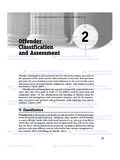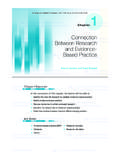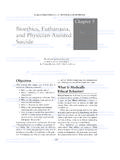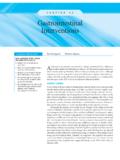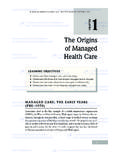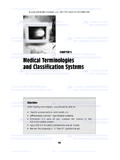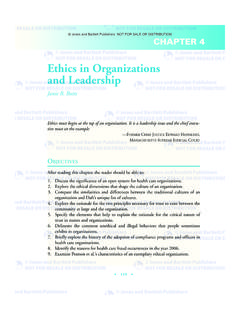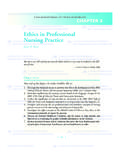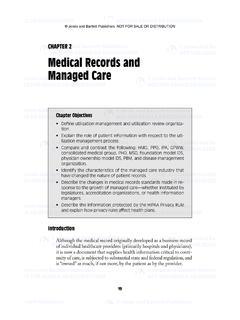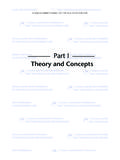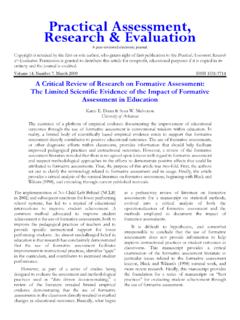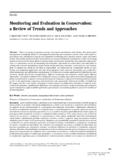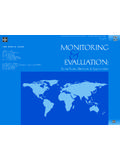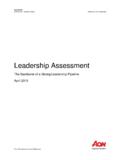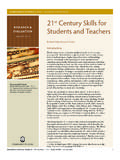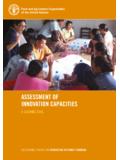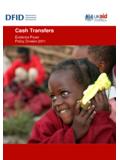Transcription of The Role of Assessment in Instruction
1 The Role of Assessmentin Instruction We re having a test in school tomorrow, and there s no way I can pass it .. Absolutely no way! CHARLIEBROWN, PEANUTS(1968)Teachers have to make decisions about students, decisions that affect student lives. Gooddecisions are based on good information. Assessment is the systematic process of collectingand interpreting information to make decisions about students. High-quality assessmentsnot only provide valuable information about student achievement, they also assist educatorsto determine the effectiveness of their instructional strategies. The higher the quality of theinformation you collect, the higher your confidence level will be when you are making impor-tant decisions about students, and the better you will sleep at night!
2 The Process of AssessmentAll assessments begin with a purpose. Classroom Assessment is a formal process thatinvolves a deliberate effort to gain information about a student s status in relation tocourse objectives. This process includes a wide range of procedures and has the ultimategoal of obtaining valid and reliable information on which to base educational , teaching, and Assessment are the three interactive components of educa-tional Instruction (Brookhart, 1999). Planning involves the establishment of instructionalobjectives and learning outcomes, which leads to decisions about the types of learningactivities that will enable students to successfully achieve the required outcomes.
3 Thedesired learning outcomes and instructional activities then guide the Assessment tech-niques. Finally, the Assessment results direct, and even modify, the teaching 2/10/07 2:50 AM Page 1 Jones and Bartlett Publishers. NOT FOR SALE OR DISTRIBUTIONF igure illustrates this relationship, which Brookhart (1999) describes as effectivewhen the Assessment instruments provide accurate, meaningful, and appropriate the main goal of classroom Assessment is to obtain valid and reliable informa-tion about student achievement, Assessment procedures also assist in appraising theeffectiveness of the Instruction . A well-designed Assessment plan helps you to optimizeyour teaching by identifying your own strengths and weaknesses.
4 The results of a class-room test based on such a plan provide answers to the following questions: What is the level of the students achievement? Are the course objectives realistic? Are the instructional methods appropriate? How well are the learning experiences sequenced?In addition to being the primary indicator of student achievement and the effec-tiveness of an educational program, student Assessment is also an integral part of thelearning process. Effective Assessment is a continuous process, which provides valuablefeedback for students, thus reinforcing successful learning and offering informationabout further learning needs. While poorly designed Assessment is at odds with learning, Assessment that is well designed not only promotes learning, but also enhances teachingby assisting both the student in learning and the teacher in teaching (Mehrens &Lehmann, 1991).
5 Well-developed classroom assessments contribute to effective studentlearning by helping students identify their strengths and weaknesses to guide their students believe that no matter what they do they will not be able to pass class-room exams, their self-confidence is undermined. You probably have heard a student say, There is no way I can pass this test. When tests are perceived as unfair or too difficult,2 Chapter 1 The Role of Assessment in InstructionPLANNINGI nstructional ObjectivesLearning OutcomesInstructional ActivitiesASSESSMENTF igure Interaction of planning, teaching, and Assessment in educational 2/10/07 2:50 AM Page 2 Jones and Bartlett Publishers. NOT FOR SALE OR DISTRIBUTION many students protect their self-esteem by giving up rather than fail repeatedly.
6 Educa-tors can counteract this syndrome by ensuring that students have a clear understandingof what is expected of them to demonstrate success, providing them with learningopportunities to achieve the expectations, and then informing them of how theirlearning will be ResponsibilityEducators have an ethical responsibility every time they assess students. In addition tohaving an ethical responsibility to students, nurse educators have a responsibility to thehealth care consumers whose care will be entrusted to the students who graduate andenter nursing practice. It is therefore imperative that assessments be trustworthy andthat you obtain high-quality information. While you may not like some of the decisionsyou have to make, you will be comfortable with those decisions if they are based ontrustworthy Assessment tests play a central role in student Assessment .
7 In light of the influencethat decisions based on these tests have on the lives of students, elaborate care must betaken when testing and grading. Fundamental to the development of valid assessmentsis the recognition that classrom test preparation deserves the same priority as the prepa-ration of classroom Instruction . Consider the amount of group effort invested in thedevelopment of a course in a nursing program. Endless meetings and discussions areheld to write objectives and content outlines and to plan learning activities. Yet, testdevelopment is often a solitary process, with individual faculty members contributingpieces to the final product, without seeing the whole picture until the test is Clements and MacDonald (1966) explain, ethical responsibility for studentassessment requires teachers to ensure that each Assessment tool Is appropriately designed Actually measures what it claims to measureIn addition, Clements and MacDonald point out that when interpreting the resultsof Assessment instruments, teachers must seriously consider the following.
8 Emotional and social impact on students Consequences of the evaluation on a student s academic lifeAssessment and Self-EfficacyOne of the most important responsibilities of a teacher is to assist students to maximizetheir success and to promote every student s self-efficacy. To promote self-efficacy, whichcan be described as the I can do it attitude, teachers need to believe that every studentcan be successful (Haladyna, 1999). Admission to a nursing program is certainly a selec-tive process, and every admitted student has the potential for success. It is the obliga-tion of the program s faculty to assist every student in becoming the process of promoting student self-efficacy, it is important to remember that astudent s sense of accomplishment is diminished if a task is too easy and is defeated if atask is too hard (Haladyna, 1999).
9 When tests are perceived as trivial, students perceiveschool work as trivial and can adopt the attitude that the process of learning is one ofAssessment and 2/10/07 2:50 AM Page 3 Jones and Bartlett Publishers. NOT FOR SALE OR DISTRIBUTION passive recall. We cannot expect students to be successful, to have the I can do itattitudeon high-stakes examinations, such as the National Council Licensure Examination(NCLEX), if they are accustomed to taking poorly constructed classroom exams that areperceived as too easy or too is unrealistic to believe that a post-program review course can teach students to besuccessful on a national examination. The best approach for fostering a realistic sense of self-efficacy is to expose students throughout their entire nursing program to well-constructedtests that require them to think critically and to apply their acquired many exams do students take over the course of a nursing program 20, 30,40?
10 It is certainly not unusual for students to answer more than 2,000 multiple-choiceitems during a nursing program. By presenting them with well-written exams that assesshigher-order thinking, nursing programs can challenge students critical thinking abilityand provide them with the best preparation for passing NCLEX. Chapter 11, PreparingStudents for the Licensure Examination: The Importance of NCLEX, offers sugges-tions for increasing your students self-confidence. Assessment InadequacyAlthough most teachers recognize and strive to fulfill their Assessment role, many expe-rience conflict originating from feelings of inadequacy. These feelings of assessmentinadequacy are understandable. While Assessment is integral to Instruction and learning,classroom Assessment and grading are generally acknowledged as the weak links inmodern education.
